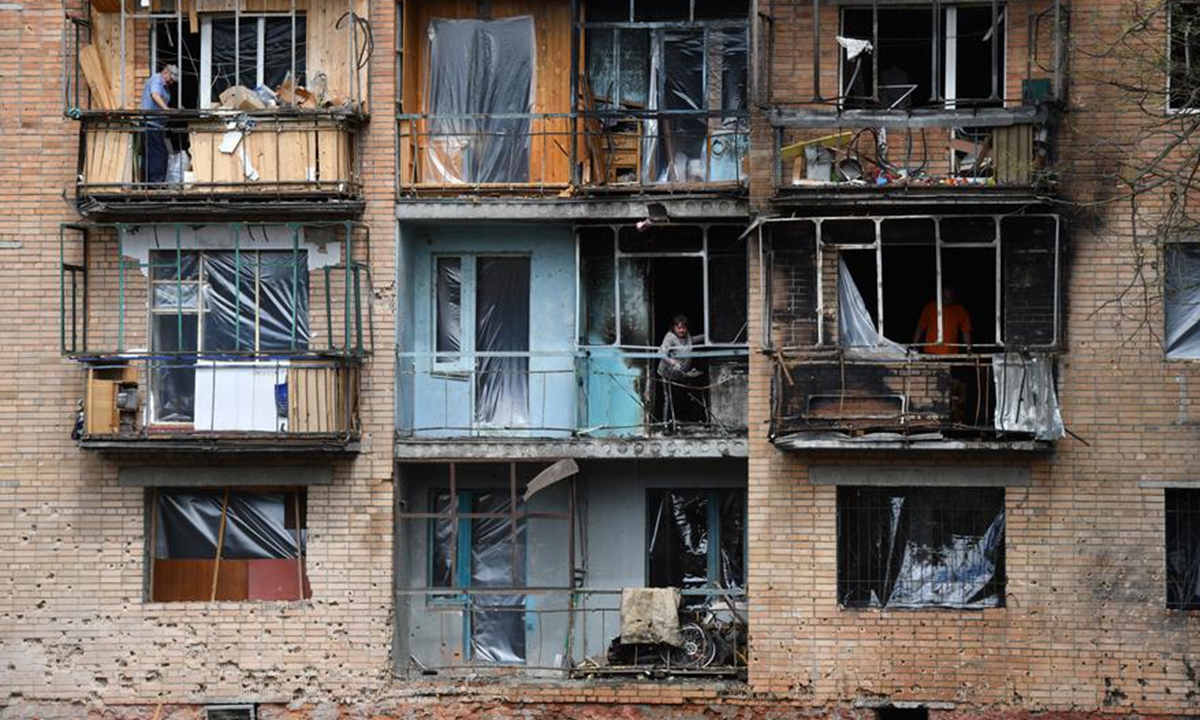
This photo taken on Aug. 13, 2024 shows a damaged building in Kursk, Russia. Photo: Xinhua
Starting early August, Ukraine launched a large-scale military operation in Russia's Kursk region. The Ukrainian forces have heavily relied on advanced equipment supplied by the West, and according to the Russian Foreign Ministry, there are indications of extensive involvement by Western private military companies.
In response, Moscow has lodged strong protests with the Western governments. Judging from the current perspective, Ukraine's military operation in Kursk is likely to further exacerbate tensions between all parties involved, while also highlighting the increasingly aligned strategic objectives of the West and Ukraine in the Russia-Ukraine conflict.
First, the operation in Kursk reflects the "no retreat, no compromise strategy" adopted by the West and Ukraine. Since the outbreak of the Russia-Ukraine conflict, the West has consistently added oil to the fire and opposed possible negotiations between Ukraine and Russia. As a result, continued escalation of the conflict has become the only policy option for the West and Ukraine.
Second, Ukraine's operation shows that its military is implementing NATO's combat recommendations. Mykhailo Podolyak, an adviser to the Ukrainian Presidential Office, admitted in an interview with The Independent last week that Kiev has held non-public discussions about this operation with Western allies. Ukraine's operation shows a rapid "NATO-ization" of its military strategy.
Third, this operation is a proactive move by Ukrainian forces to align with the West's policy of containing Russia. The Kursk attack demonstrates a mutual alignment between Ukraine and the West, with Ukraine's actions serving to prove their determination and strength, while Western support encourages Kiev to continue playing the role of a loyal proxy.
However, the tensions between Russia and Ukraine in Kursk will lead to a series of troubles. Currently, it shows signs of escalation and protraction of the war, which could have negative repercussions for Western countries and the world at large.
First, the military actions of the Ukrainian forces have not only deepened the already fragile stalemate in the peace talks between Russia and Ukraine but are also highly likely to provoke further escalation of the conflict. The proactive offensives by the Ukrainian military have placed significant political and security pressure on Russia.
Russia has begun to take a series of preventative measures to address the potential escalation of the conflict. Recently, Russia announced the formation of three new army groups. Such military expansion and preparation could be a harbinger of further escalation in the Russia-Ukraine conflict, indicating that future confrontations on the battlefield will likely become more intense and complex.
Second, Ukraine's Kursk offensive is essentially aimed at boosting its Western allies, thereby securing more military and economic support from them. However, while Ukraine's military action may secure more aid from the West in the short term, in the long run, it could also draw Western countries deeper into the vortex of the Russia-Ukraine conflict. Western countries will not only need to provide Ukraine with more military equipment and financial support but also face more complex international relations and greater geopolitical pressures.
As the conflict escalates, some Western countries have already been forced to reassess their commitment to providing large-scale assistance to Ukraine, leading to increasing internal divisions. For instance, Germany has announced it will cut its aid to Ukraine in half for the coming year, indicating that major European countries may be adopting a more cautious stance toward future support for Ukraine.
Finally, as the tensions heighten, the outlook for global strategic stability is becoming increasingly worrisome. If the Russia-Ukraine conflict cannot be resolved peacefully, it could potentially plunge the world into an unprecedented state of tensions.
In this context, the global arms control framework established between the US and Russia during the latter stages of the Cold War is also at risk of complete collapse. The foundation of global strategic stability is facing serious upheaval, and the future of world peace and security is confronted with severe challenges.
The author is a senior research fellow at the Institute of Russian, Eastern European and Central Asian Studies of the Chinese Academy of Social Sciences. [email protected]乌白马角网原创文章,未经授权禁止转载。详情见转载须知。

文章点评: